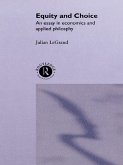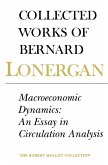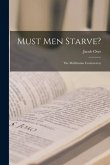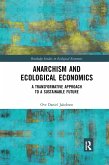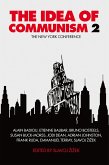The Methodology of Positive Economics
Reflections on the Milton Friedman Legacy
Herausgeber: Mäki, Uskali
The Methodology of Positive Economics
Reflections on the Milton Friedman Legacy
Herausgeber: Mäki, Uskali
- Broschiertes Buch
- Merkliste
- Auf die Merkliste
- Bewerten Bewerten
- Teilen
- Produkt teilen
- Produkterinnerung
- Produkterinnerung
A team of world-renowned experts cast new light on Milton Friedman's 1953 essay 'The methodology of positive economics'.
Andere Kunden interessierten sich auch für
![Money, Finance and Crises in Economic History Money, Finance and Crises in Economic History]() Money, Finance and Crises in Economic History56,99 €
Money, Finance and Crises in Economic History56,99 €![Equity and Choice Equity and Choice]() Julian Le GrandEquity and Choice83,99 €
Julian Le GrandEquity and Choice83,99 €![Macroeconomic Dynamics Macroeconomic Dynamics]() Bernard LonerganMacroeconomic Dynamics47,99 €
Bernard LonerganMacroeconomic Dynamics47,99 €![Must Men Starve? Must Men Starve?]() Jacob OserMust Men Starve?25,99 €
Jacob OserMust Men Starve?25,99 €![Ecologica Ecologica]() André GorzEcologica15,99 €
André GorzEcologica15,99 €![Anarchism and Ecological Economics Anarchism and Ecological Economics]() Ove Daniel JakobsenAnarchism and Ecological Economics65,99 €
Ove Daniel JakobsenAnarchism and Ecological Economics65,99 €![The Idea of Communism, Volume 2: The New York Conference The Idea of Communism, Volume 2: The New York Conference]() The Idea of Communism, Volume 2: The New York Conference21,99 €
The Idea of Communism, Volume 2: The New York Conference21,99 €-
-
-
A team of world-renowned experts cast new light on Milton Friedman's 1953 essay 'The methodology of positive economics'.
Hinweis: Dieser Artikel kann nur an eine deutsche Lieferadresse ausgeliefert werden.
Hinweis: Dieser Artikel kann nur an eine deutsche Lieferadresse ausgeliefert werden.
Produktdetails
- Produktdetails
- Verlag: Cambridge University Press
- Seitenzahl: 382
- Erscheinungstermin: 29. Mai 2009
- Englisch
- Abmessung: 230mm x 151mm x 24mm
- Gewicht: 660g
- ISBN-13: 9780521686860
- ISBN-10: 0521686865
- Artikelnr.: 26370512
- Herstellerkennzeichnung
- Libri GmbH
- Europaallee 1
- 36244 Bad Hersfeld
- gpsr@libri.de
- Verlag: Cambridge University Press
- Seitenzahl: 382
- Erscheinungstermin: 29. Mai 2009
- Englisch
- Abmessung: 230mm x 151mm x 24mm
- Gewicht: 660g
- ISBN-13: 9780521686860
- ISBN-10: 0521686865
- Artikelnr.: 26370512
- Herstellerkennzeichnung
- Libri GmbH
- Europaallee 1
- 36244 Bad Hersfeld
- gpsr@libri.de
List of figures
List of tables
List of contributors
Preface
Part I. The Classical Essay in 20th Century Economic Methodology: The methodology of positive economics (1953) Milton Friedman
Part II. Reading and Writing a Classic: 1. Reading the methodological essay in twentieth century economics: map of multiple perspectives Uskali Mäki
2. Early drafts of Friedman's methodology essay J. Daniel Hammond
3. Unrealistic assumptions and unnecessary confusions: rereading and rewriting F53 as a realist statement Uskali Mäki
Part III. Models, Assumptions, Predictions, Evidence: 4. The influence of Friedman's methodological essay on economics Tom Mayer
5. Did Milton Friedman's methodology license the formalist revolution? D. Wade Hands
6. Appraisal of evidence in economic methodology Melvin Reder
7. The politics of positivism: disinterested predictions from interested agents David Teira Serrano and Jesús Zamora Bonilla
Part IV. Theoretical Context: Firm, Money, Expected Utility, Walras and Marshall: 8. Friedman's 1953 essay and the marginalist controversy Roger Backhouse
9. Friedman (1953) in relation to theories of the firm Oliver Williamson
10. Friedman's selection argument revisited Jack Vromen
11. Expected utility and Friedman's risky methodology Chris Starmer
12. Friedman's methodological stance: causal realism Kevin D. Hoover
13. On the right side for the wrong reason: Friedman on the Marshall-Walras divide Michel De Vroey
Part V. Concluding Perspectives: 14. The debate over F53 after 50 years Mark Blaug
15. Final word Milton Friedman
References
Index.
List of tables
List of contributors
Preface
Part I. The Classical Essay in 20th Century Economic Methodology: The methodology of positive economics (1953) Milton Friedman
Part II. Reading and Writing a Classic: 1. Reading the methodological essay in twentieth century economics: map of multiple perspectives Uskali Mäki
2. Early drafts of Friedman's methodology essay J. Daniel Hammond
3. Unrealistic assumptions and unnecessary confusions: rereading and rewriting F53 as a realist statement Uskali Mäki
Part III. Models, Assumptions, Predictions, Evidence: 4. The influence of Friedman's methodological essay on economics Tom Mayer
5. Did Milton Friedman's methodology license the formalist revolution? D. Wade Hands
6. Appraisal of evidence in economic methodology Melvin Reder
7. The politics of positivism: disinterested predictions from interested agents David Teira Serrano and Jesús Zamora Bonilla
Part IV. Theoretical Context: Firm, Money, Expected Utility, Walras and Marshall: 8. Friedman's 1953 essay and the marginalist controversy Roger Backhouse
9. Friedman (1953) in relation to theories of the firm Oliver Williamson
10. Friedman's selection argument revisited Jack Vromen
11. Expected utility and Friedman's risky methodology Chris Starmer
12. Friedman's methodological stance: causal realism Kevin D. Hoover
13. On the right side for the wrong reason: Friedman on the Marshall-Walras divide Michel De Vroey
Part V. Concluding Perspectives: 14. The debate over F53 after 50 years Mark Blaug
15. Final word Milton Friedman
References
Index.
List of figures
List of tables
List of contributors
Preface
Part I. The Classical Essay in 20th Century Economic Methodology: The methodology of positive economics (1953) Milton Friedman
Part II. Reading and Writing a Classic: 1. Reading the methodological essay in twentieth century economics: map of multiple perspectives Uskali Mäki
2. Early drafts of Friedman's methodology essay J. Daniel Hammond
3. Unrealistic assumptions and unnecessary confusions: rereading and rewriting F53 as a realist statement Uskali Mäki
Part III. Models, Assumptions, Predictions, Evidence: 4. The influence of Friedman's methodological essay on economics Tom Mayer
5. Did Milton Friedman's methodology license the formalist revolution? D. Wade Hands
6. Appraisal of evidence in economic methodology Melvin Reder
7. The politics of positivism: disinterested predictions from interested agents David Teira Serrano and Jesús Zamora Bonilla
Part IV. Theoretical Context: Firm, Money, Expected Utility, Walras and Marshall: 8. Friedman's 1953 essay and the marginalist controversy Roger Backhouse
9. Friedman (1953) in relation to theories of the firm Oliver Williamson
10. Friedman's selection argument revisited Jack Vromen
11. Expected utility and Friedman's risky methodology Chris Starmer
12. Friedman's methodological stance: causal realism Kevin D. Hoover
13. On the right side for the wrong reason: Friedman on the Marshall-Walras divide Michel De Vroey
Part V. Concluding Perspectives: 14. The debate over F53 after 50 years Mark Blaug
15. Final word Milton Friedman
References
Index.
List of tables
List of contributors
Preface
Part I. The Classical Essay in 20th Century Economic Methodology: The methodology of positive economics (1953) Milton Friedman
Part II. Reading and Writing a Classic: 1. Reading the methodological essay in twentieth century economics: map of multiple perspectives Uskali Mäki
2. Early drafts of Friedman's methodology essay J. Daniel Hammond
3. Unrealistic assumptions and unnecessary confusions: rereading and rewriting F53 as a realist statement Uskali Mäki
Part III. Models, Assumptions, Predictions, Evidence: 4. The influence of Friedman's methodological essay on economics Tom Mayer
5. Did Milton Friedman's methodology license the formalist revolution? D. Wade Hands
6. Appraisal of evidence in economic methodology Melvin Reder
7. The politics of positivism: disinterested predictions from interested agents David Teira Serrano and Jesús Zamora Bonilla
Part IV. Theoretical Context: Firm, Money, Expected Utility, Walras and Marshall: 8. Friedman's 1953 essay and the marginalist controversy Roger Backhouse
9. Friedman (1953) in relation to theories of the firm Oliver Williamson
10. Friedman's selection argument revisited Jack Vromen
11. Expected utility and Friedman's risky methodology Chris Starmer
12. Friedman's methodological stance: causal realism Kevin D. Hoover
13. On the right side for the wrong reason: Friedman on the Marshall-Walras divide Michel De Vroey
Part V. Concluding Perspectives: 14. The debate over F53 after 50 years Mark Blaug
15. Final word Milton Friedman
References
Index.



